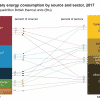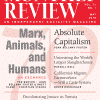
June 2019 (Volume 71, Number 2)
The situation in Venezuela has become extremely dire due to Washington’s heightened economic warfare, its continuing attempts to engineer a political coup, and its growing threats of massive military intervention—all aimed at bringing down the Bolivarian Republic. The recent seizure of Venezuelan oil assets in the United States and its gold reserves in British banks, as well as the sanctioning of Venezuelan oil sales, have come on top of a long series of economic sanctions—beginning with the Obama administration and now intensified under Trump’s—that constitute nothing less than a modern form of siege warfare, extended to food supplies and medicine. But the Venezuelan Revolution has managed to resist in the face of the economic and political warfare of the most powerful imperialist nation in the world, and the reasons why are to be found in the nature of the Bolivarian Revolution and the Venezuelan people themselves. | more…

Superbugs in the Anthropocene
The promise of a world without disease has been replaced by warnings of evermore virulent pathogens, created by the very drugs that were supposed to save us. Scarcely a day passes without more news of people contracting infections or infectious diseases that cannot be cured by the strongest medicines available. Antimicrobial Resistance is a global health crisis driven by two major factors: the spectacular ability of bacteria to adapt to threats, and a pharmaceutical industry and health care system that puts profit before people. In addition to devastating climate change, the Anthropocene may be defined by epidemics that medicine cannot cure. | more…

Energy, Economic Growth, and Ecological Crisis
Can economic growth continue forever? This relatively simple question has posed some intellectual headaches for modern capitalism. Capital cannot tolerate any limits—that is, the drive for growth and the search for new markets are both necessary for the political and economic survival of capitalism. Viewed in this light, the implications of the question present something of an existential challenge to the current order. Capitalism cannot acknowledge any natural limits to economic growth, for that would mean acknowledging its ultimate demise. To keep up the pretense that capitalism represents a quasi-eternal and invincible system, most political leaders and economists who support the current order have begun reciting a series of elaborate narratives about the relationship between human economies and the natural world. | more…

The Yellow Vests in France
The Yellow Vests (gilets jaunes) movement first appeared in October 2018 and is active everywhere in France. As this article was written, the spontaneous mobilization was in its twenty-first week. The demonstrations are mainly organized around traffic circles, where protesters block transportation lines. While their concrete demands are about wages, these demands are not presented by workers’ actions aimed at defending the value of labor power, but rather as part of a citizens’ movement, as referred to by the media and many of the demonstrators. In this way, the site of political confrontation has been shifted. | more…

The Contemporary Contours of Imperialism
Situated largely within the Marxist debates on imperialism—but addressing the liberal formulations too—The Changing Face of Imperialism: Colonialism to Contemporary Capitalism is an important intervention regarding the material basis of imperialism and its three-hundred-year-old history of unequal power relations. The book broadly addresses five issues: (1) the nature of finance capital and the novel yet familiar processes of value extraction; (2) the world of capital; (3) global production networks and labor regimes; (4) the institutional system of nation-states in the new global order; and (5) the nature of integration from colonial regimes to now. | more…

May 2019 (Volume 71, Number 1)
Monthly Review is now seventy years old, with its first issue appearing in May 1949. In this month’s issue, the editors reflect on the legacy of MR, the people who built it, and the ones who keep it going today. | more…

Absolute Capitalism
Although neoliberalism is widely recognized as the central political-ideological project of twenty-first-century capitalism, it is a term that is seldom uttered by those in power. Behind this particular ruse lies a deeply disturbing, even hellish, reality. Neoliberalism can be defined as an integrated ruling-class political-ideological project, associated with the rise of monopoly-finance capital, the principal strategic aim of which is to embed the state in capitalist market relations. Hence, the state’s traditional role in safeguarding social reproduction—if largely on capitalist-class terms—is now reduced solely to one of promoting capitalist reproduction. The goal is nothing less than the creation of an absolute capitalism. All of this serves to heighten the extreme human and ecological destructiveness that characterizes our time. | more…

Salvador Allende: ‘Not in My Name’
On February 11, 2019, Ariel Dorfman published an article in the Nation, in which he imagined the advice of the late Chilean president Salvador Allende would supposedly offer Nicolás Maduro in order to confront successfully the challenges of the current Venezuelan conjuncture. This is Allende’s fictional reply to Dorfman. | more…

Decolonizing Justice in Tunisia
Building on decades of struggle, the January 2011 Tunisian uprising triggered a wave of popular revolt that spread across North Africa and West Asia. After the uprising, Tunisia became the focus of a celebrated project of transitional justice, which is now the globally mandated method of reconciling victims and perpetrators following a nonrevolutionary regime change. However, Tunisia’s process of transitional justice must be critically examined. The very paradigm employed—that is, the rule of law that transitional justice consistently seeks to impose—is skewed in favor of imperial interests, which can be traced to the paradigm’s origins in the mid–twentieth century victory of European powers over Nazi Germany and its allies. There are other models of justice, however, that are not rooted in this Eurocentric victor’s history, but instead derive from revolutionary traditions. A key one is the People’s Tribunal, used since the late 1960s. The convening of a People’s Tribunal in Tunisia could help amplify and extend the popular-justice claims that surfaced during the country’s recent transitional-justice process. Establishing such a tribunal might help build a symbolic reservoir and organizational force that could ultimately contribute to substantial revolutionary change in the country. | more…

Marx, Animals, and Humans
The December 2018 issue of Monthly Review featured John Bellamy Foster and Brett Clark’s “Marx and Alienated Speciesism” and Christian Stache’s “On the Origins of Animalist Marxism: Rereading: Ted Benton and the Economic and Philosophic Manuscripts of 1844,” both of which take up Ted Benton’s work on animals and Marxism. Here Ted Benton offers a response to the critiques offered by Foster and Clark, and Stache. | more…

Marx and the Critique of Alienated Speciesism
In this continuation of the exchange on “Marx and Alienated Speciesism” and “On the Origins of Animalist Marxism,” John Bellamy Foster and Brett Clark, and then Christian Stache, reply to Ted Benton. | more…

California’s Migrant Farmworkers
“No one comes out here. No one knows what we go through,” Roberto Valdez, a farmworker in the Coachella Valley town of Thermal, California, tells Gabriel Thompson, the interviewer and editor of Chasing the Harvest, a recently published book of interviews with farmworkers, growers, union activists, teachers, and others. And as one reads through the compelling stories that are told in the collection, one gets a deep sense of what Roberto means, as well as a passionate urge to have others know of the life and work of those who labor in California’s fields. | more…

Unionizing the World’s Largest Slaughterhouse
Capitalism has many victims, but few fare as badly as slaughterhouse workers. Every day, meatpacking workers risk life and limb to provide cheap meat for consumers. Despite this, political scientist Timothy Pachirat once described slaughterhouse work as a form of labor “considered morally and physically repellent by the vast majority of society that is sequestered from view rather than eliminated or transformed.” Yet, slaughterhouses are the sites of some of labor’s greatest triumphs. Lynn Waltz documents one such triumph in her book Hog Wild, which describes how meatpacking workers successfully established a union at the Tar Heel slaughterhouse in North Carolina. While Waltz focuses on the particular fight at the Tar Heel plant, the unionization success of the workers there provides important lessons for future labor struggles. | more…